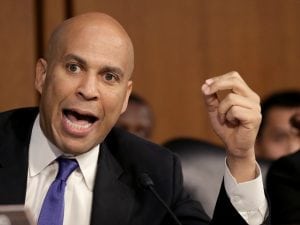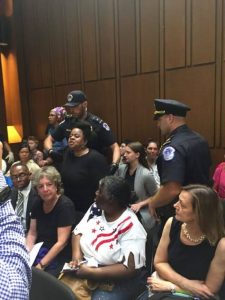Now that Judge Brett Kavanaugh has survived three days and almost 30 hours of examination and cross-examination by the 21-member Senate Judicial Committee it is only a matter of time before he is confirmed as the newest Supreme Court justice.
As someone who watched the ENTIRE three-days of the hearings, I feel like the old Alka-Seltzer TV commercial in which a man who ate several pounds of lasagna groans as he struggles to suppress a belch: “I can’t believe I ate the whole thing.”
Here are a few of my observations. Please forgive any belching.
I have never seen so many grandstanding senators struggling to get their moment under the TV lights. Of course, some, such as Cory Booker (N.J.) and Kamala Harris (Calif.) who are running for president in 2020 saw the Kavanaugh hearings as one of the first stops on their campaign trails. Both did their best to score points during the hearings, Booker going so far as to offer to be booted from the Senate for releasing a confidential document about Judge Kavanaugh’s stance on racial profiling. Nevermind that the document Booker threatened to “release” was made public the night before.

One of the best moments of the hearings came Thursday when Republican Ben Sasse of Nebraska gave the committee and those watching a 15-minute civics lesson on the way the three branches of government (Executive, Legislative, and Judicial) should operate and then decried why hearings such as the Kavanaugh hearing have devolved into a circus of protests, TV cameras, and hateful speech.
“It’s because legislators who are supposed to make laws don’t really do it,” Sasse said. “They appoint bureaucrats to do what legislators should have done, and when things go wrong, as they always do, the public can’t find a face to blame and so they look to the most obvious thing: The nine people sitting on the Supreme Court, whose faces they can see and whose opinions they can excoriate.
“What we mostly do in Congress is not pass laws but permit bureaucracy X, Y, or Z to make law-like regulations. We write giant pieces of legislation with undefined terms — and then say the secretary of such-and-such shall promulgate rules that do the rest of our jobs. Legislators love power more than the people and job security more than preserving liberty. The reason this institution punts its power to exec-branch agencies is that it’s a convenient way to avoid responsibility for unpopular decisions. If your biggest long-term priority is just re-election, then, sadly, giving away power is a good strategy.”
I felt like applauding when I heard that. I suspect a lot of people in the hearing room felt the same way, but decorum prohibited such displays.
Of course, the concept of decorum was NOT a factor for the dozens of loudmouthed demonstrators who continually interrupted the hearings with shouts and insults hurled at Kavanaugh, President Trump, and members of the Judicial Committee. Over and over again Capitol Police hustled unruly and vociferous demonstrators from the room.
At several points during the hearing it was clear to me that many senators—especially those on the left side of the room—didn’t understand or didn’t want to acknowledge the fact that a judge does not make laws and policy, he follows them via legal precedent.
That point was lost on Democrat Senators like Dick Durbin of Illinois who grilled Kavanaugh on a case involving a pregnant teenage illegal immigrant who wanted an abortion while she was in the United States. “You are stopping her from getting an abortion,” Durbin asserted during one exchange.

“I’m not,” Kavanaugh responded. “I’m a judge. I’m not making the policy. My job is to decide whether that policy is consistent with law. What do I do? I look at the precedent.”
Durbin still didn’t get it, and he continually vilified Kavanaugh for his stance. So Kavanaugh had to repeatedly defend himself saying he was not the one responsible for the policy—he was a judge making a fair ruling on that policy.
After that exchange, it was manifestly clear to me how Democrat senators on the Judicial Committee view the U.S. Supreme Court. Not as a body charged with acting as the final judge in all cases involving laws made by Congress as well as the Constitution, but as a body that should bend and manipulate those laws and the Constitution to fit a particular political ideology.
If that’s the case, then it is little wonder why they so vehemently oppose Judge Kavanaugh’s appointment to the Supreme Court. He is a strict constitutionalist who believes in the inviolability of the Constitution, not in its continual undermining and deterioration the way so many on the left do today.
These hearings demonstrated that Kavanaugh believes in the sanctity of the First Amendment, the magnitude of the Second Amendment, and the importance of the remaining 25.
The First and Second, especially, have come under attack in recent years. Thank God Brett Kavanaugh, our next Supreme Court justice will be a bulwark against those who want to take away our rights of free speech and to keep and bear arms.
As for me, I think I have had enough Senate hearings to last me until I join the Great Majority.
And I still can’t believe I watched the WHOLE THING!



